Contribution of Pituitary Gland and Dehydration in Diabetes Insipidus
VerifiedAdded on 2023/06/05
|7
|1088
|469
AI Summary
This study discusses the contribution of pituitary gland towards blood osmolality and the presence of dehydration in diabetes insipidus. It explains how the pituitary gland regulates the antidiuretic hormone to maintain blood osmolarity and how diabetes insipidus leads to excessive thirst and frequent urination. The study concludes that proper nutrition, sufficient water, regular exercises, and healthy practices can be effective for human biological development.
Contribute Materials
Your contribution can guide someone’s learning journey. Share your
documents today.

Assessment 1
Secure Best Marks with AI Grader
Need help grading? Try our AI Grader for instant feedback on your assignments.
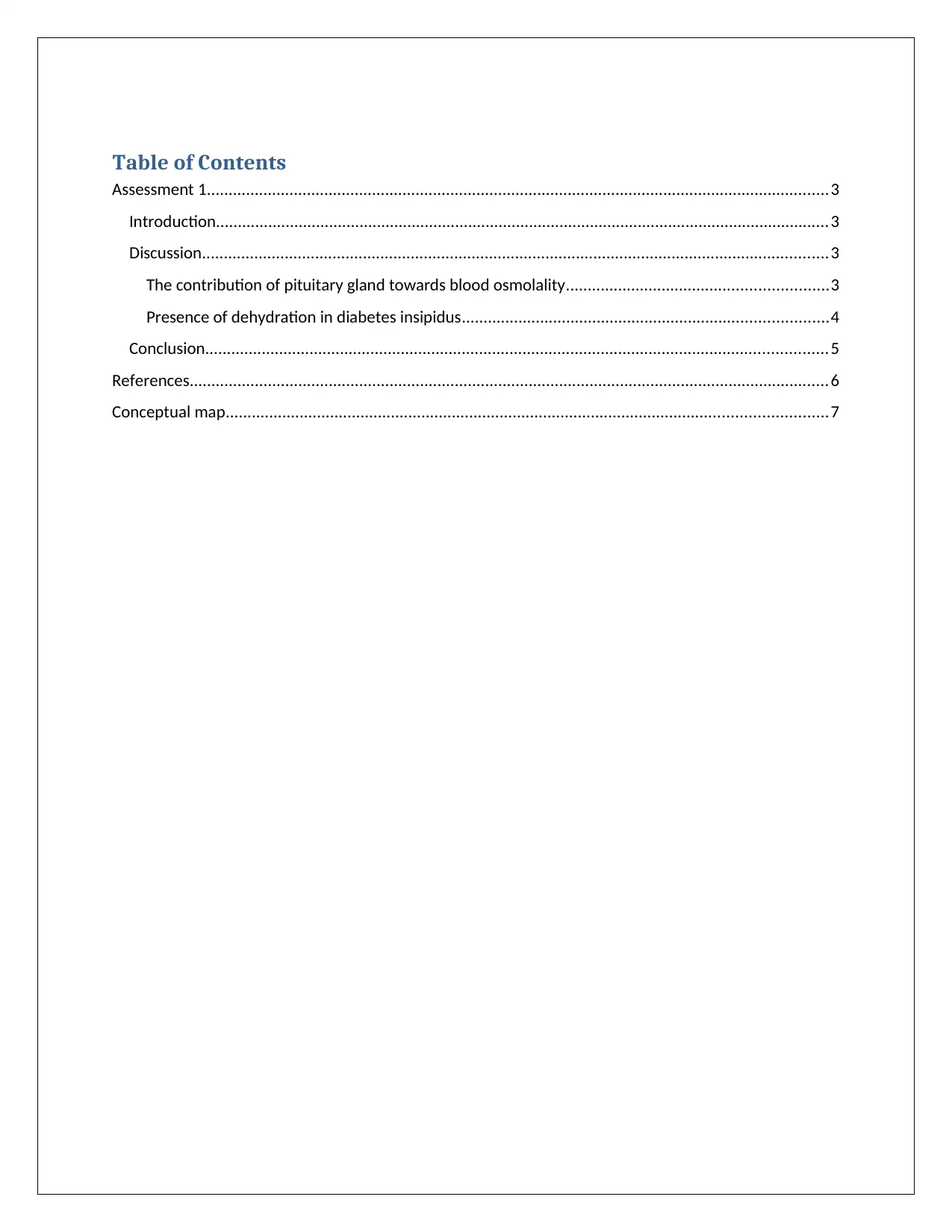
Table of Contents
Assessment 1...............................................................................................................................................3
Introduction.............................................................................................................................................3
Discussion................................................................................................................................................3
The contribution of pituitary gland towards blood osmolality............................................................3
Presence of dehydration in diabetes insipidus....................................................................................4
Conclusion...............................................................................................................................................5
References...................................................................................................................................................6
Conceptual map..........................................................................................................................................7
Assessment 1...............................................................................................................................................3
Introduction.............................................................................................................................................3
Discussion................................................................................................................................................3
The contribution of pituitary gland towards blood osmolality............................................................3
Presence of dehydration in diabetes insipidus....................................................................................4
Conclusion...............................................................................................................................................5
References...................................................................................................................................................6
Conceptual map..........................................................................................................................................7
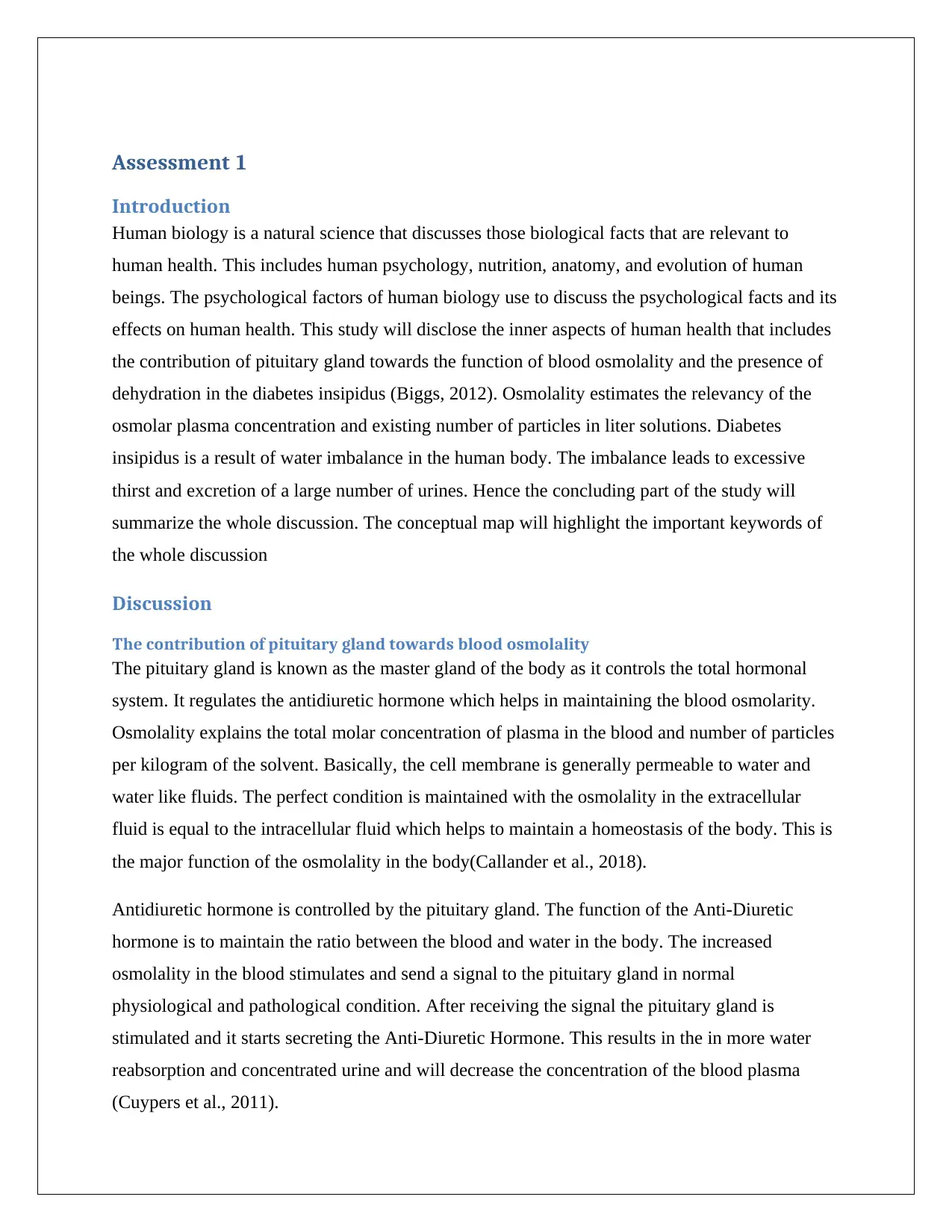
Assessment 1
Introduction
Human biology is a natural science that discusses those biological facts that are relevant to
human health. This includes human psychology, nutrition, anatomy, and evolution of human
beings. The psychological factors of human biology use to discuss the psychological facts and its
effects on human health. This study will disclose the inner aspects of human health that includes
the contribution of pituitary gland towards the function of blood osmolality and the presence of
dehydration in the diabetes insipidus (Biggs, 2012). Osmolality estimates the relevancy of the
osmolar plasma concentration and existing number of particles in liter solutions. Diabetes
insipidus is a result of water imbalance in the human body. The imbalance leads to excessive
thirst and excretion of a large number of urines. Hence the concluding part of the study will
summarize the whole discussion. The conceptual map will highlight the important keywords of
the whole discussion
Discussion
The contribution of pituitary gland towards blood osmolality
The pituitary gland is known as the master gland of the body as it controls the total hormonal
system. It regulates the antidiuretic hormone which helps in maintaining the blood osmolarity.
Osmolality explains the total molar concentration of plasma in the blood and number of particles
per kilogram of the solvent. Basically, the cell membrane is generally permeable to water and
water like fluids. The perfect condition is maintained with the osmolality in the extracellular
fluid is equal to the intracellular fluid which helps to maintain a homeostasis of the body. This is
the major function of the osmolality in the body(Callander et al., 2018).
Antidiuretic hormone is controlled by the pituitary gland. The function of the Anti-Diuretic
hormone is to maintain the ratio between the blood and water in the body. The increased
osmolality in the blood stimulates and send a signal to the pituitary gland in normal
physiological and pathological condition. After receiving the signal the pituitary gland is
stimulated and it starts secreting the Anti-Diuretic Hormone. This results in the in more water
reabsorption and concentrated urine and will decrease the concentration of the blood plasma
(Cuypers et al., 2011).
Introduction
Human biology is a natural science that discusses those biological facts that are relevant to
human health. This includes human psychology, nutrition, anatomy, and evolution of human
beings. The psychological factors of human biology use to discuss the psychological facts and its
effects on human health. This study will disclose the inner aspects of human health that includes
the contribution of pituitary gland towards the function of blood osmolality and the presence of
dehydration in the diabetes insipidus (Biggs, 2012). Osmolality estimates the relevancy of the
osmolar plasma concentration and existing number of particles in liter solutions. Diabetes
insipidus is a result of water imbalance in the human body. The imbalance leads to excessive
thirst and excretion of a large number of urines. Hence the concluding part of the study will
summarize the whole discussion. The conceptual map will highlight the important keywords of
the whole discussion
Discussion
The contribution of pituitary gland towards blood osmolality
The pituitary gland is known as the master gland of the body as it controls the total hormonal
system. It regulates the antidiuretic hormone which helps in maintaining the blood osmolarity.
Osmolality explains the total molar concentration of plasma in the blood and number of particles
per kilogram of the solvent. Basically, the cell membrane is generally permeable to water and
water like fluids. The perfect condition is maintained with the osmolality in the extracellular
fluid is equal to the intracellular fluid which helps to maintain a homeostasis of the body. This is
the major function of the osmolality in the body(Callander et al., 2018).
Antidiuretic hormone is controlled by the pituitary gland. The function of the Anti-Diuretic
hormone is to maintain the ratio between the blood and water in the body. The increased
osmolality in the blood stimulates and send a signal to the pituitary gland in normal
physiological and pathological condition. After receiving the signal the pituitary gland is
stimulated and it starts secreting the Anti-Diuretic Hormone. This results in the in more water
reabsorption and concentrated urine and will decrease the concentration of the blood plasma
(Cuypers et al., 2011).
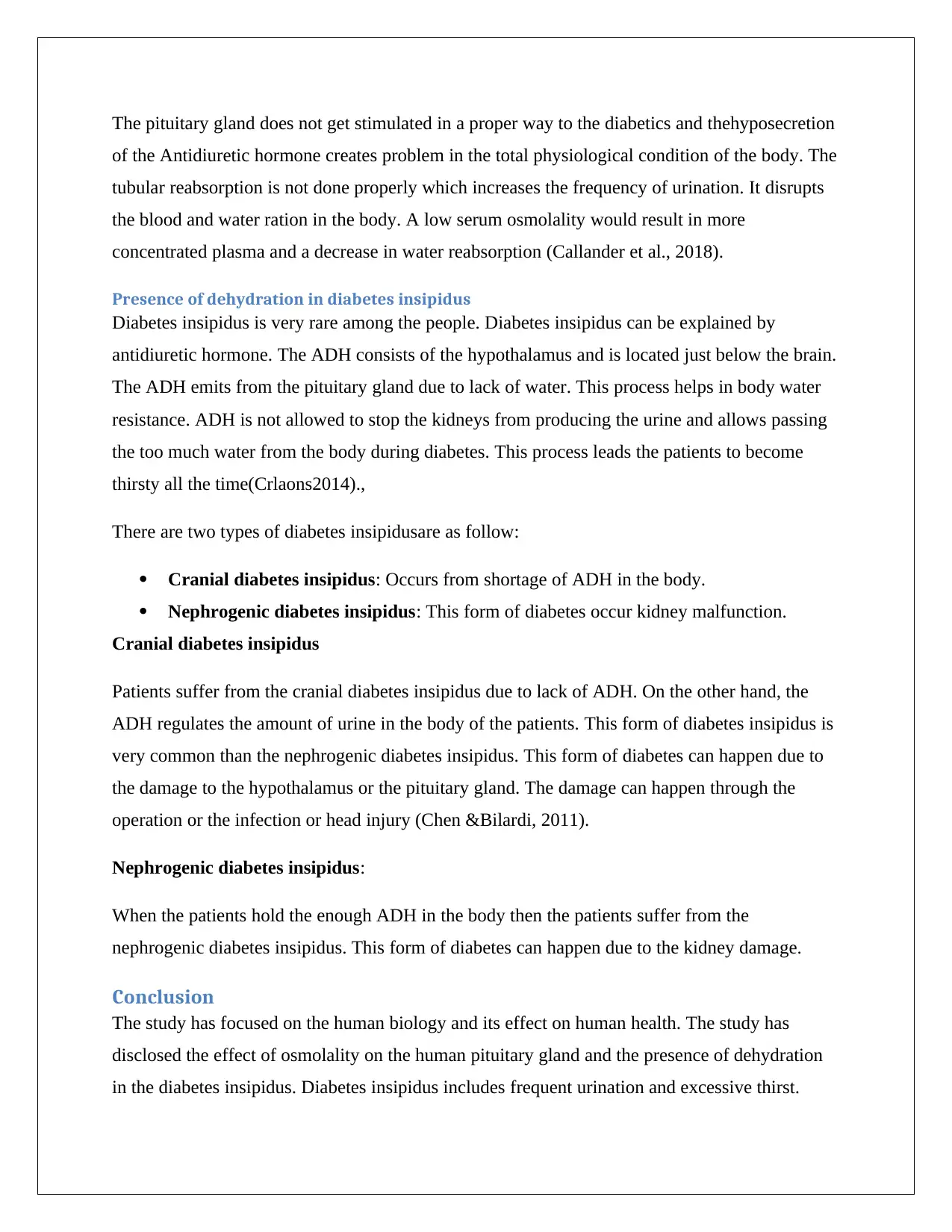
The pituitary gland does not get stimulated in a proper way to the diabetics and thehyposecretion
of the Antidiuretic hormone creates problem in the total physiological condition of the body. The
tubular reabsorption is not done properly which increases the frequency of urination. It disrupts
the blood and water ration in the body. A low serum osmolality would result in more
concentrated plasma and a decrease in water reabsorption (Callander et al., 2018).
Presence of dehydration in diabetes insipidus
Diabetes insipidus is very rare among the people. Diabetes insipidus can be explained by
antidiuretic hormone. The ADH consists of the hypothalamus and is located just below the brain.
The ADH emits from the pituitary gland due to lack of water. This process helps in body water
resistance. ADH is not allowed to stop the kidneys from producing the urine and allows passing
the too much water from the body during diabetes. This process leads the patients to become
thirsty all the time(Crlaons2014).,
There are two types of diabetes insipidusare as follow:
Cranial diabetes insipidus: Occurs from shortage of ADH in the body.
Nephrogenic diabetes insipidus: This form of diabetes occur kidney malfunction.
Cranial diabetes insipidus
Patients suffer from the cranial diabetes insipidus due to lack of ADH. On the other hand, the
ADH regulates the amount of urine in the body of the patients. This form of diabetes insipidus is
very common than the nephrogenic diabetes insipidus. This form of diabetes can happen due to
the damage to the hypothalamus or the pituitary gland. The damage can happen through the
operation or the infection or head injury (Chen &Bilardi, 2011).
Nephrogenic diabetes insipidus:
When the patients hold the enough ADH in the body then the patients suffer from the
nephrogenic diabetes insipidus. This form of diabetes can happen due to the kidney damage.
Conclusion
The study has focused on the human biology and its effect on human health. The study has
disclosed the effect of osmolality on the human pituitary gland and the presence of dehydration
in the diabetes insipidus. Diabetes insipidus includes frequent urination and excessive thirst.
of the Antidiuretic hormone creates problem in the total physiological condition of the body. The
tubular reabsorption is not done properly which increases the frequency of urination. It disrupts
the blood and water ration in the body. A low serum osmolality would result in more
concentrated plasma and a decrease in water reabsorption (Callander et al., 2018).
Presence of dehydration in diabetes insipidus
Diabetes insipidus is very rare among the people. Diabetes insipidus can be explained by
antidiuretic hormone. The ADH consists of the hypothalamus and is located just below the brain.
The ADH emits from the pituitary gland due to lack of water. This process helps in body water
resistance. ADH is not allowed to stop the kidneys from producing the urine and allows passing
the too much water from the body during diabetes. This process leads the patients to become
thirsty all the time(Crlaons2014).,
There are two types of diabetes insipidusare as follow:
Cranial diabetes insipidus: Occurs from shortage of ADH in the body.
Nephrogenic diabetes insipidus: This form of diabetes occur kidney malfunction.
Cranial diabetes insipidus
Patients suffer from the cranial diabetes insipidus due to lack of ADH. On the other hand, the
ADH regulates the amount of urine in the body of the patients. This form of diabetes insipidus is
very common than the nephrogenic diabetes insipidus. This form of diabetes can happen due to
the damage to the hypothalamus or the pituitary gland. The damage can happen through the
operation or the infection or head injury (Chen &Bilardi, 2011).
Nephrogenic diabetes insipidus:
When the patients hold the enough ADH in the body then the patients suffer from the
nephrogenic diabetes insipidus. This form of diabetes can happen due to the kidney damage.
Conclusion
The study has focused on the human biology and its effect on human health. The study has
disclosed the effect of osmolality on the human pituitary gland and the presence of dehydration
in the diabetes insipidus. Diabetes insipidus includes frequent urination and excessive thirst.
Secure Best Marks with AI Grader
Need help grading? Try our AI Grader for instant feedback on your assignments.

Then osmolality can be estimated from an osmolar function that is derived from sodium and
potassium. Hence, proper nutrition, sufficient water, regular exercises, and healthy practices can
be effective for human biological development (Estrada-Montoya, 2011).
potassium. Hence, proper nutrition, sufficient water, regular exercises, and healthy practices can
be effective for human biological development (Estrada-Montoya, 2011).
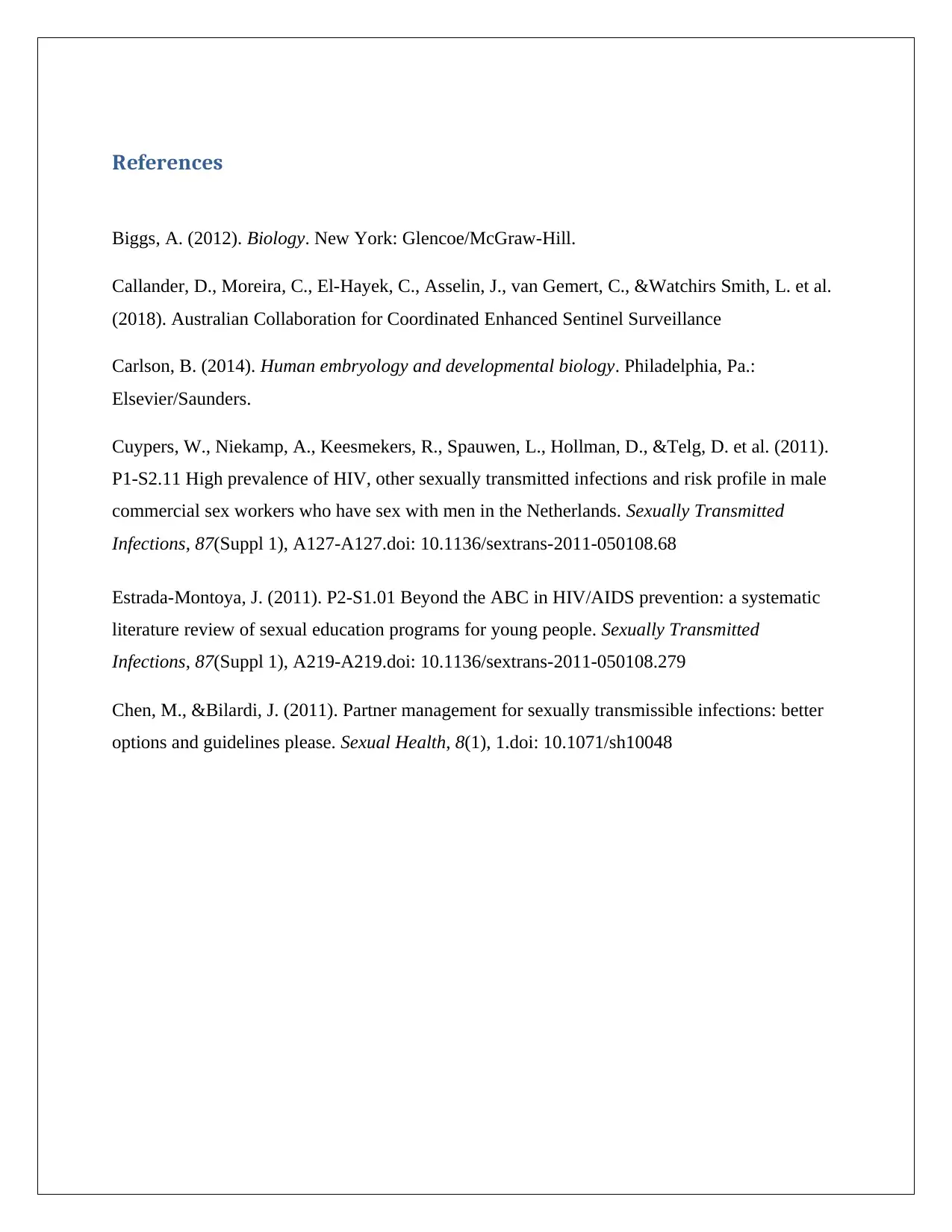
References
Biggs, A. (2012). Biology. New York: Glencoe/McGraw-Hill.
Callander, D., Moreira, C., El-Hayek, C., Asselin, J., van Gemert, C., &Watchirs Smith, L. et al.
(2018). Australian Collaboration for Coordinated Enhanced Sentinel Surveillance
Carlson, B. (2014). Human embryology and developmental biology. Philadelphia, Pa.:
Elsevier/Saunders.
Cuypers, W., Niekamp, A., Keesmekers, R., Spauwen, L., Hollman, D., &Telg, D. et al. (2011).
P1-S2.11 High prevalence of HIV, other sexually transmitted infections and risk profile in male
commercial sex workers who have sex with men in the Netherlands. Sexually Transmitted
Infections, 87(Suppl 1), A127-A127.doi: 10.1136/sextrans-2011-050108.68
Estrada-Montoya, J. (2011). P2-S1.01 Beyond the ABC in HIV/AIDS prevention: a systematic
literature review of sexual education programs for young people. Sexually Transmitted
Infections, 87(Suppl 1), A219-A219.doi: 10.1136/sextrans-2011-050108.279
Chen, M., &Bilardi, J. (2011). Partner management for sexually transmissible infections: better
options and guidelines please. Sexual Health, 8(1), 1.doi: 10.1071/sh10048
Biggs, A. (2012). Biology. New York: Glencoe/McGraw-Hill.
Callander, D., Moreira, C., El-Hayek, C., Asselin, J., van Gemert, C., &Watchirs Smith, L. et al.
(2018). Australian Collaboration for Coordinated Enhanced Sentinel Surveillance
Carlson, B. (2014). Human embryology and developmental biology. Philadelphia, Pa.:
Elsevier/Saunders.
Cuypers, W., Niekamp, A., Keesmekers, R., Spauwen, L., Hollman, D., &Telg, D. et al. (2011).
P1-S2.11 High prevalence of HIV, other sexually transmitted infections and risk profile in male
commercial sex workers who have sex with men in the Netherlands. Sexually Transmitted
Infections, 87(Suppl 1), A127-A127.doi: 10.1136/sextrans-2011-050108.68
Estrada-Montoya, J. (2011). P2-S1.01 Beyond the ABC in HIV/AIDS prevention: a systematic
literature review of sexual education programs for young people. Sexually Transmitted
Infections, 87(Suppl 1), A219-A219.doi: 10.1136/sextrans-2011-050108.279
Chen, M., &Bilardi, J. (2011). Partner management for sexually transmissible infections: better
options and guidelines please. Sexual Health, 8(1), 1.doi: 10.1071/sh10048
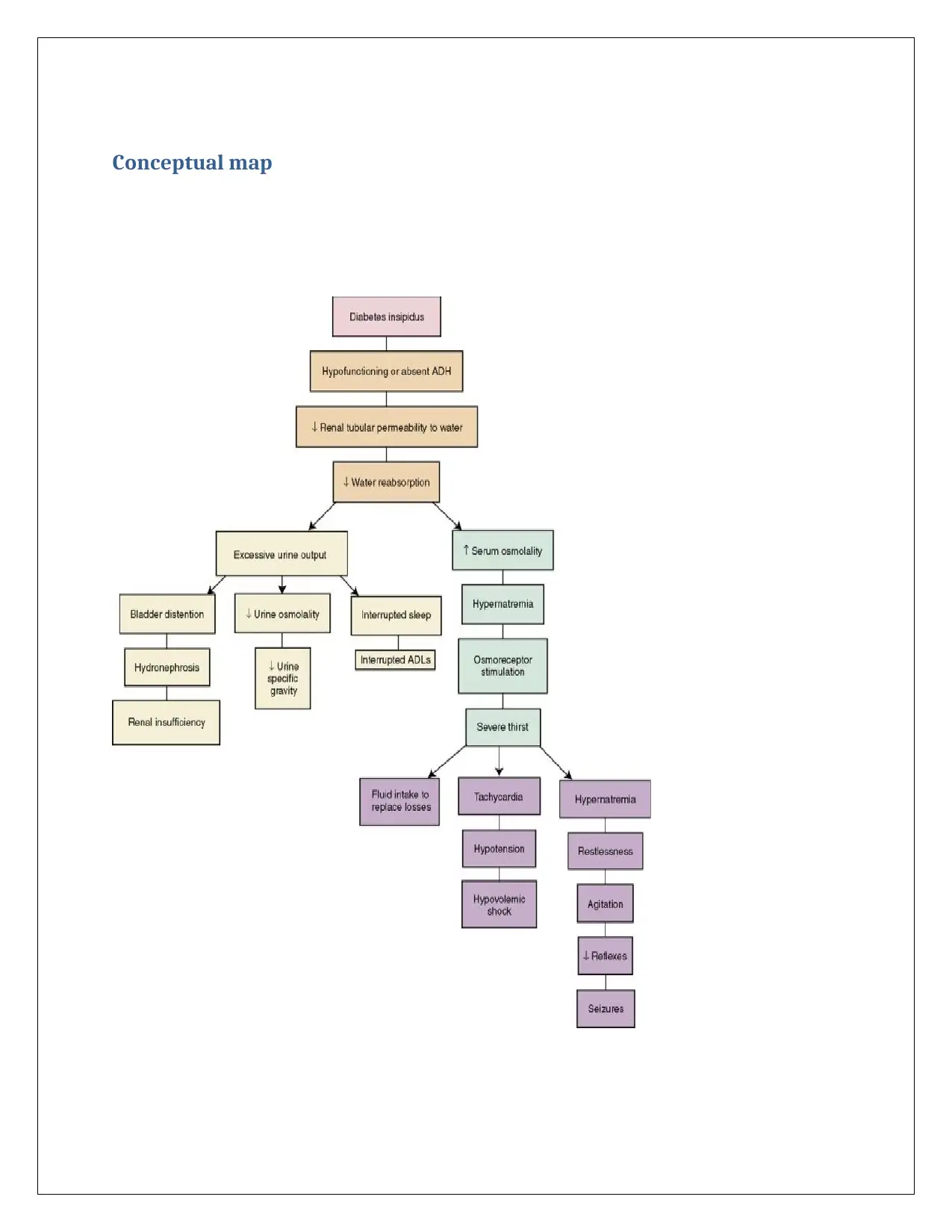
Conceptual map
1 out of 7
Related Documents
Your All-in-One AI-Powered Toolkit for Academic Success.
+13062052269
info@desklib.com
Available 24*7 on WhatsApp / Email
![[object Object]](/_next/static/media/star-bottom.7253800d.svg)
Unlock your academic potential
© 2024 | Zucol Services PVT LTD | All rights reserved.





